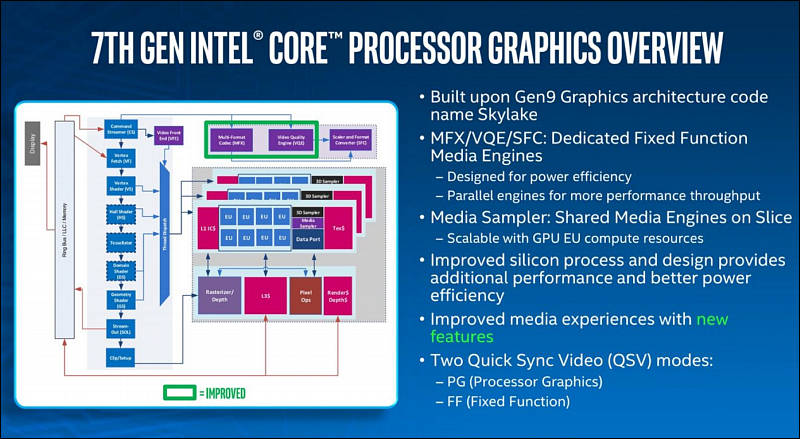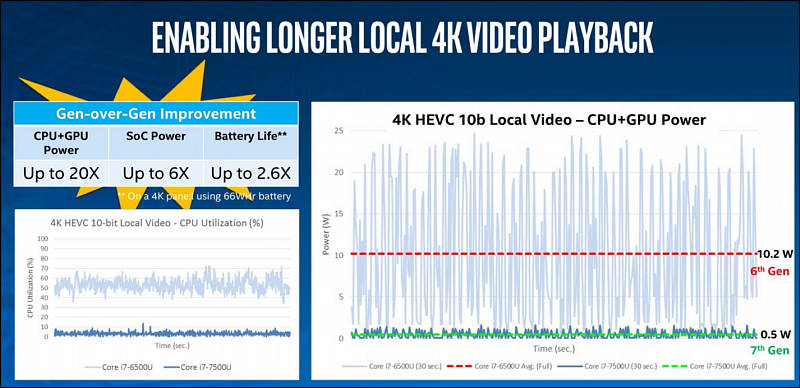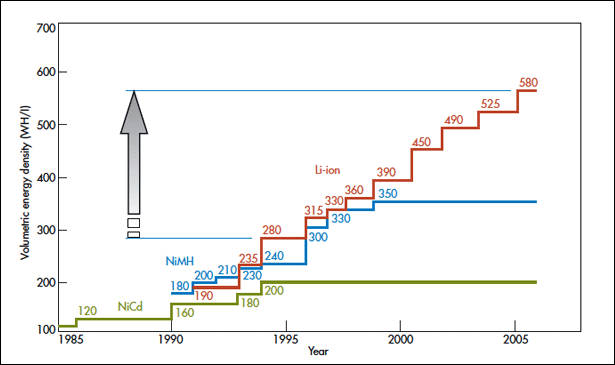
-

For example it means that this generation will be unable to playback some HEVC 4k p60 footage made with upcoming cameras.None of models will support HEVC 422 and 444 playback.
Processors will lack support for HDMI 2.0 ports with HDCP 2.2.



-
Intel also set record prices with U and Y 2 core processors sold for up to $393 in volume.
For desktop processors coming in January it is expected around 20-25% price hike compared to previous generation. To mitigate issues Intel plan to remove from market previous models as fast as possible.
-
The state of CPU evolution is really sad at this moment - Kaby Lake CPUs neither outperform 2-generation-old Broadwell CPUs significantly in "instructions per cycle", nor does any existing or announced Kaby Lake CPU provide as much overall computing power than the high-end Broadwell models - because they have fewer cores.
Besides the non-HDMI-2.0 fail Kaby Lake also does not support USB 3.1 - how lame is that at this point in time?
I guess it will really require some serious competition from AMD's Zen CPUs to force Intel to provide some actual, significant improvements again. Let's hope AMD can deliver to their recent announcements at the end of this year.
-
I guess it will really require some serious competition from AMD's Zen CPUs to force Intel to provide some actual, significant improvements again.
I want to see some detailed logic in proposals that competition is universal solution. Competition can be nature solution for slow and full of huge errors selection of species. Competition is also always waste of resources. Competition is huge progress stopper due to copyright and patents. Isn't it strange to state it as universal tool and as universal solution of human beings?
AMD CPUs won't change anything, it is physics laws that make things slow down.

This is how they look for batteries (li-ion batteries also now are on almost flat stage).

 img1303.jpg615 x 365 - 30K
img1303.jpg615 x 365 - 30K -
If AMD brings that chip to market, you will suddenly see a new chip that will miraculously perform better from Intel
-
If AMD brings that chip to market, you will suddenly see a new chip that will miraculously perform better from Intel
I am now seriously thinking about making church focused on concurrency and competition as central gods.
-
The slow down in shrinking the structures and becoming more energy efficient in CPUs certainly has its reason in the physical possibilities. But there is no reason why CPU manufacturers could not stuff more cores into one chip, and at cheaper prices.
CPU dies could be 3d-stacked like recent Flash RAM chips. More sophisticated chip cooling methods could be developed. Materials other than silicon could be used. There's lots of opportunity for possible improvements, but we'll see none of this unless those who could afford the investments have an incentive to actually try. And at this time, Intel just doesn't have this incentive, they can continue to sell what they already have at high prices for large profits.
-
Chip makers already have stuffed a lot more cores into a similar die size, but the power requirements (and heat generation) go up substantially when they do. You can buy 10-core chips from a few generations ago for around $200 on ebay as long as you don't mind your desktop CPU having a 185-watt TDP (I can't remember the exact TDP numbers, but they are pretty big).
And manufacturers are also already investing in materials other than silicon. It takes a lot of money and time to spin up production for alternatives.
-
But there is no reason why CPU manufacturers could not stuff more cores into one chip, and at cheaper prices.
Well, no. Stuffing more cores idea has it's limits. Cost rise due to defects affecting more chips. You need more memory channels, you need more cache and it is very hard to place it near chips on such big things.
More sophisticated chip cooling methods could be developed. Materials other than silicon could be used.
It is physics, as you stack one chip on top of another you have multiple layers of quite high thermal resistance. So, even best cooling on top won't save bottom chips. 3D idea is very old and firms only started to use it lately due to complexity and costs involved.
Idea to use other materials is also very old, but it comes with many issues and added costs.
Intel just doesn't have this incentive, they can continue to sell what they already have at high prices for large profits.
So, you mean that in capitalism to make any progress you need financial stimulus (banana) or competition that pose threat to your existence (lion). Sounds barbarian, isn't it? As it is animals stimulus to action.
-
I want to see some detailed logic in proposals that competition is universal solution. Competition can be nature solution for slow and full of huge errors selection of species. Competition is also always waste of resources. Competition is huge progress stopper due to copyright and patents. Isn't it strange to state it as universal tool and as universal solution of human beings?
Cost efficiency and innovation are necessary components for achieving true competition. It is a natural pressure in economics that determines what pricing advantage one company will enjoy over another. It is the exact opposite of wasting resources as it tends to increase the productivity level of a company and the value of its products. Companies that hold a genuine productivity and value advantage can leverage it to advance an innovative business plan that in turn outpaces competitors.
That being said, few companies will be able to maintain an everlasting advantage over their competitors and that can probably be attributed in part to Chaos theory.
-
Cost efficiency and innovation are necessary components for achieving true competition. It is a natural pressure in economics that determines what pricing advantage one company will enjoy over another. It is the exact opposite of wasting resources as it tends to increase the productivity level of a company and the value of its products. Companies that hold a genuine productivity and value advantage can leverage it to advance an innovative business plan that in turn outpaces competitors.
Sounds like paragraph from capitalism marketing brochure.
First, innovation is just bullshit word, let's throw it out for clarity.
Competition is ALWAYS, 100% of time, wasting of resources (including human resources). As it means that you need more factories, more doubling developers, more land, more of the same. Same for retails. Competition never lead to actual price decrease (only to increase of costs!), it just allows to decrease price from monopoly level.
Laws of capitalism dictate that you have constantly increasing monopolization. Larger and larger corporations. It is not because some hidden aliens plot. It is because competition and market are highly inefficient. Corporations remove any market behavior and almost all competition inside themselves and after this go and crash any remaining competition.
That being said, few companies will be able to maintain an everlasting advantage over their competitors and that can probably be attributed in part to Chaos theory.
None of the companies can have ANY advantage for any prolonged period of time in capitalism, until they use governments, patens, copyright or just open crime (all of them are things hated by invincible market hand guys).
-
Sounds like paragraph from capitalism marketing brochure.
I have to live and work in a real world and those are my beliefs formed from observations that cover the duration of my life working both for others in business and with the establishment of my own small business. We're all entitled to our own opinions and perspective.
Competition is ALWAYS, 100% of time, wasting of resources (including human resources). As it means that you need more factories, more doubling developers, more land, more of the same. Same for retails. Competition never lead to actual price decrease (only to increase of costs!), it just allows to decrease price from monopoly level.
Competition is usually an incremental process and it can spark from something as simple as the creation of a new idea or concept (true innovation). It does not 100% of the time require new factories to be built and land to be purchased, that is actually rarely the case with mature products. What you describe sounds more like an economy of scale approach. That can lead to price competition for commodity products but it is hardly the sole scope of competition in business. And perceived value isn't determined by pricing alone.
It is because competition and market are highly inefficient. Corporations remove any market behavior and almost all competition inside themselves and after this go and crash any remaining competition.
None of the companies can have ANY advantage for any prolonged period of time in capitalism, until they use governments, patens, copyright or just open crime (all of them are things hated by invincible market hand guys).
These are typically fascist companies masquerading under the guise of capitalism. They enjoy their chrony-capitalism and act above the law with the blessing and further enabling of their government benefactors.
In a true capitalist model (which I willingly cede will only ever exist in theory) there is opportunity for disruption that can lead to the toppling of corporations as they implode under the weight of their own stagnation. But that can only occur under a system which does not protect those that have become "too big to fail." Unfortunately we're becoming more and more removed from the honesty of failure and the resulting opportunity it provides to businesses of all sizes within the system.
-
We're all entitled to our own opinions and perspective.
I do not think that we are entitled to our opinions. I think that we must use our mind and information we can get to get closer to real truth. Idea that everyone have right for their own good opinion had been always spread by exploiters.
Competition is usually an incremental process and it can spark from something as simple as the creation of a new idea or concept (true innovation). It does not 100% of the time require new factories to be built and land to be purchased, that is actually rarely the case with mature products. What you describe sounds more like an economy of scale approach. That can lead to price competition for commodity products but it is hardly the sole scope of competition in business. And perceived value isn't determined by pricing alone.
And now we have paragraph from idealism brochure. Thing that feel wrong for you is that you share normal capitalist ideology, especially it relate to economics and society - idealism. Hence you even try to avoid hard truth by jumping to ideas world.
No, every competition in capitalism is material process. It is new big malls, and price of it is included in every product price you pay. It is excessive factories that are periodically destroyed (leaving rotten society around) and build far away by new owners again, and it is also all included in society expenses. It is hundreds of thousands of shitty products that went directly to dump or reached dump after very short period of ownership. All of them required time, fuel, resources.
And perceived value isn't determined by pricing alone.
I do not care about perceived value. I care about cost for society.
These are typically fascist companies masquerading under the guise of capitalism. They enjoy their chrony-capitalism and act above the law with the blessing and further enabling of their government benefactors.
Always, I mean always check terms that you use. And always check capitalism laws. It is normal corporations, and fascism is where capitalists drop all fascinating game accessories and openly act as they want (it does not mean that they tell you their true intentions - they never do it).
Fascism in power is the open, terroristic dictatorship of the most reactionary, the most chauvinistic, the most imperialistic elements of finance capitalism.
In a true capitalist model (which I willingly cede will only ever exist in theory) there is opportunity for disruption that can lead to the toppling of corporations as they implode under the weight of their own stagnation. But that can only occur under a system which does not protect those that have become "too big to fail." Unfortunately we're becoming more and more removed from the honesty of failure and the resulting opportunity it provides to businesses of all sizes within the system.
One thing I find sad is that horribly old and horrible wrong Austrian school views became so widespread lately. I fully understand reasons for this, as fairy tale of some proper, true capitalism is required as all ACTUAL and REAL laws become too visible for ordinary public.
No such thing as "honesty of failure" and all this Austrian things ever existed. But actual laws of capitalism is that makes things around you as they are. Not some "crony capitalism", it is just usual capitalism.
-
Intel has faced varying amounts of competition over its history. They mostly sold RAM in the early days and didn't really get serious about the processor market until the personal computer boom of the 1980s. By 1991, they were the largest semiconductor manufacturer in the world by revenue, a position they have held ever since.
But over this 40+ year history, regardless of Intel's position in the market, Moore's Law has continued to hold and processor improvement has progressed at a fairly predictable clip.
So, why the slowdown now?
It's not competition. Intel faced a lot of competition in the 1980s (from Motorola, NEC, IBM, etc.), comparatively little competition in the 1990s, more competition from AMD in early 2000s, and so on. But still processor improvements raced along through all of those eras. In fact, personal computer processors (desktop and laptop) are now a declining part of the overall processor market. All of the growth has been in the mobile processor market (phones, tablets, etc.) lately. And there, Intel is doing quite poorly, with less than 5% market share. Instead of x86, the ARM instruction set dominates and chips from Qualcomm, MediaTek, Apple, and Samsung all sell more than Intel.
And that's the market that is growing. So really, Intel faces as much competition in the processor market as ever.
So, it seems much more likely that the slowdown in the pace of progress is not due to market factors (which have varied over time), but is instead due to the laws of physics, which are increasingly constraining developments in semiconductor technology.
Howdy, Stranger!
It looks like you're new here. If you want to get involved, click one of these buttons!
Categories
- Topics List23,993
- Blog5,725
- General and News1,354
- Hacks and Patches1,153
- ↳ Top Settings33
- ↳ Beginners256
- ↳ Archives402
- ↳ Hacks News and Development56
- Cameras2,368
- ↳ Panasonic995
- ↳ Canon118
- ↳ Sony156
- ↳ Nikon96
- ↳ Pentax and Samsung70
- ↳ Olympus and Fujifilm102
- ↳ Compacts and Camcorders300
- ↳ Smartphones for video97
- ↳ Pro Video Cameras191
- ↳ BlackMagic and other raw cameras116
- Skill1,960
- ↳ Business and distribution66
- ↳ Preparation, scripts and legal38
- ↳ Art149
- ↳ Import, Convert, Exporting291
- ↳ Editors191
- ↳ Effects and stunts115
- ↳ Color grading197
- ↳ Sound and Music280
- ↳ Lighting96
- ↳ Software and storage tips266
- Gear5,420
- ↳ Filters, Adapters, Matte boxes344
- ↳ Lenses1,582
- ↳ Follow focus and gears93
- ↳ Sound499
- ↳ Lighting gear314
- ↳ Camera movement230
- ↳ Gimbals and copters302
- ↳ Rigs and related stuff273
- ↳ Power solutions83
- ↳ Monitors and viewfinders340
- ↳ Tripods and fluid heads139
- ↳ Storage286
- ↳ Computers and studio gear560
- ↳ VR and 3D248
- Showcase1,859
- Marketplace2,834
- Offtopic1,320






